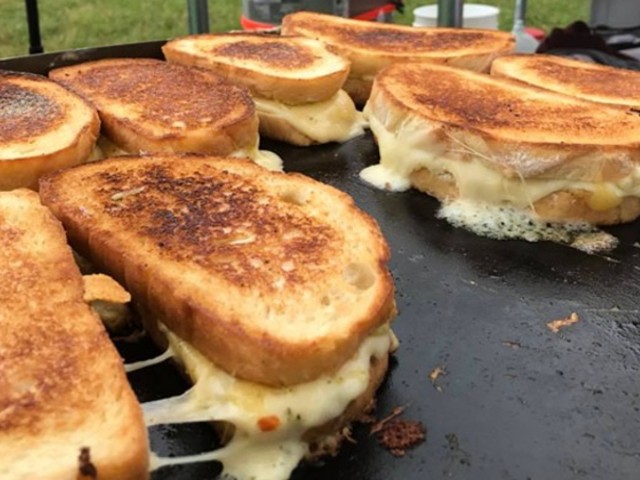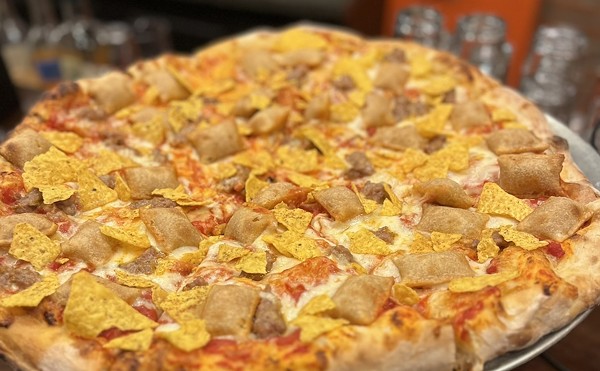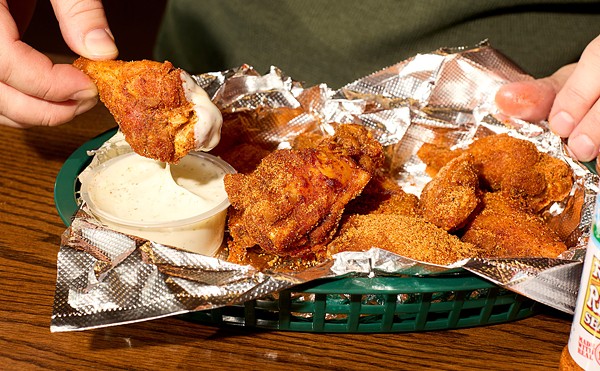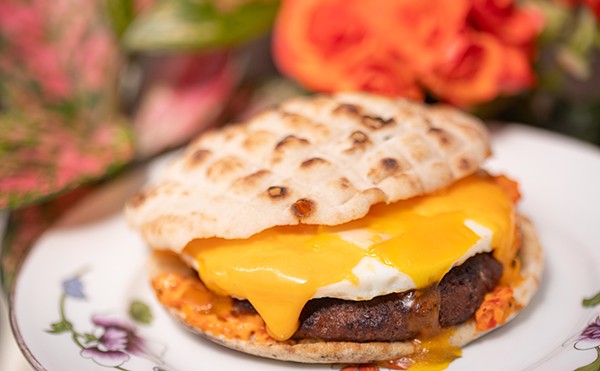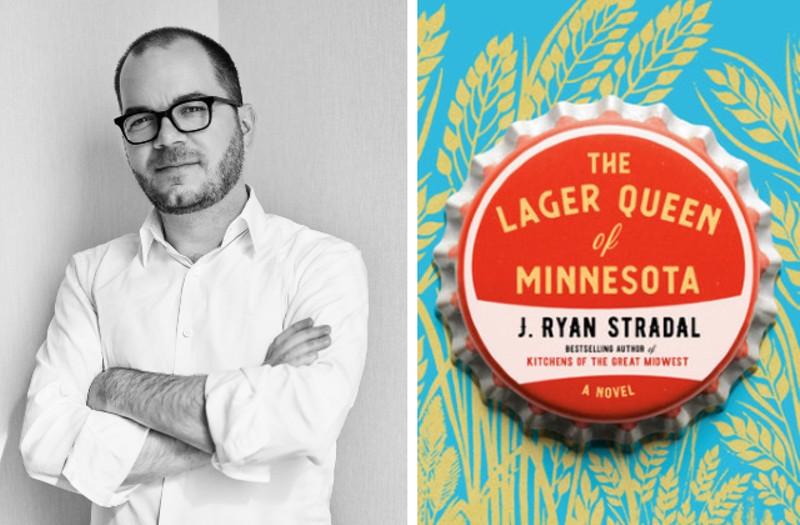
Franco Tettamanti (right), courtesy Viking / Pamela Dorman Books
J. Ryan Stradal's second novel, The Lager Queen of Minnesota, was released in July.
There are many reasons that J. Ryan Stradal's debut novel, Kitchens of the Great Midwest, has stayed with me since first reading it in 2016. Stradal's gifts as a writer are manifold: He seems to effortlessly inhabit the different voices and experiences of his cast of characters and describes their worlds so vividly and intimately that you feel as if you, too, are friends with them. What has stayed with me the most, though, is Stradal's appreciation and reverence for Minnesota's food culture, which is richly described in the book.
The story unfolds the unlikely origins and inspirations of a second-generation chef based in Minneapolis who achieves success and fame far beyond her hometown. Threaded with beautiful, sensory descriptions of food and cooking — think regional specialities like lutefisk, dessert bars and hot dish — the book conjures a rich web of interconnected characters orbiting the restaurant industry. Stradal understands that food has the power to connect us no matter how disparate our experiences, and his writing reminds us that we can travel and explore new food cultures without leaving the comfort of home. To that end, the book includes recipes for some of the most important dishes featured throughout the novel, a lovely and thoughtful inclusion for curious home cooks.
In July, Stradal's second book, The Lager Queen of Minnesota, hit bookstores across the country. While Kitchens is mostly focused on food traditions in Minnesota, Lager Queen explores the state's rich beer-brewing history through three generations of women. Both books center on strong female protagonists and chart multiple generations of relatives, exploring the complexity of the family we're born into and the kind we find on our own. Lager Queen is at turns insightful, educational, hilarious and heartbreaking, bottling the same spirit and ambition of his first novel while diving into an entirely new subject.
If you're already a fan of Stradal's writing or eager to learn more, you're in luck: Tonight, he will host a beer reception and talk at Third Wheel Brewing (4008 North Service Road, St. Peters) in St. Peters in partnership with the St. Charles City-County Library. The beer reception kicks off at 6:30 p.m. and the talk begins at 7 p.m., with books available for purchase courtesy of Main Street Books in St. Charles. (The event is open to guests ages 21 and older and is free, although prior registration is requested.) The stop at Third Wheel comes in the middle of Stradal's national Lager Queen book tour, which has been, as much as possible, hosted at local craft breweries.
I recently caught up with Stradal to learn more about the inspiration behind his two novels, how he set about researching and writing them and the joy he's found in visiting craft breweries like Third Wheel.
Both of your novels weave together multi-generational stories of family and friends. What inspired you to structure both stories in this way?
It's important to me as a person from Hastings, Minnesota, that as much as I felt like I belonged to a larger world growing up there, I never felt I had to reject the world I grew up in to accept the new one. I feel like you can have it both ways, or I really want to believe that, and I continue to. Even if you have to physically leave a place, you can just add to the world that you're from; it never has to leave your heart. And the people who make you who you are in those places — the family, the friends, the teachers — they'll always be a part of you. Even if you leave to join a different world or a larger world, you get to have that as a part of your personality going forward. That's not a story I was seeing a lot in fiction. There's a very common trope in fiction where someone has to outright reject their background or where that background is rendered completely inaccessible to them — it has to be destroyed in order for them to advance. And I thought [of both], "Well, that hasn't been my experience. I'd really like to tell the story of normal people." I come from a small Midwest town and I still identify with that place as very much my home even after twenty years living in California like I do. I wanted to read about those people. Like my characters, I had to assemble a family of choice in California; I didn't know anyone. And of course, as it turns out, so many of my friends are from Wisconsin, Iowa, I have a friend from St. Louis. You find your family of choice, and often they're people a lot like you.
You've lived in California for two decades, but obviously your childhood in Minnesota is inspiring your work today. Why is it important to you to write stories based in the Midwest?
There's a lot of great Minnesota fiction out there, and I just wanted there to be more. Every time I'd go into a bookstore and see another book set in Brooklyn, Cape Cod or California, I'd say, "You know, I want to come into a bookstore and say to myself, "There's another goddamn book about Minnesota!" And I remember how important that was to me as a kid, to see my home region represented in the books I was reading — what a kick I got out of that and how rare a kick that was.
And frankly, growing up in the Midwest presented me with so many more puzzles and conundrums than California even that I was still unpacking as an adult in terms of how the state and the region made me who I am. I've always felt that Minnesotans and people in the Northern Midwest have a ton of complexity — you just have to earn it. [Laughs.] They're not the sort of people who wear their vulnerability on their sleeve, so in order for you to get to know those aspects of them, you really have to earn their trust over a period of time. I wanted to tell that story and having moved to the coast, I felt I wasn't done thinking about where I'm from and its people.
You're clearly very interested in food writing as well as grounding stories in your home state. Did one passion lead to the other, and if so, which came first?
The answer is both. I really wanted to tell food stories, but I also viewed food and drink as one of the things that makes the Midwest special. Quite simply, we do things here in the upper half of the Mississippi [River] and the Great Lakes region that just aren't done as well or aren't done quite like anywhere else does them. I wanted to talk about that food, people's relationship with that food and Midwesterners in general. When it came to beer, this region, from St. Louis north to Minnesota and across the Great Lakes, that was the real epicenter of beer production historically in the U.S., and I wasn't even aware of that until I started researching Lager Queen. I thought that when we hit 3,000 or 4,000 breweries in the country several years ago that it had to be some sort of high watermark and I was surprised that it wasn't. In the 1880s there were more than that! Now we've exceeded that number — we're over 5,000 in the country. But I was really surprised to hear that at one time before Prohibition my hometown of Hastings, Minnesota, had three breweries and it was a fraction of the size it is now; [after Prohibition] we didn't even get our first craft brewery until three years ago. [Laughs.] That's such an interesting part of any subculture is not just its food but its food history and what, if anything, has carried over from the past. I wanted to hearken back to that, because growing up in the Midwest, you see these names of old lager breweries on the sides of old bars, especially in the rural parts of our states, and they may be for beer that doesn't exist anymore, or is now owned by a larger entity. Now it's a relic, but nonetheless, it's woven into our history.
And they aren't just lagers anymore.
Yep, exactly. Now we sit here on this land that was lager country for over a century and create IPAs on it. I'm not surprised to see things like lagers starting to emerge on craft beer menus in the past year. It's a callback to the origin of this beer realm in the Midwest, and I'm frankly happy about it. But even so, I couldn't predict it; the book ends in 2019 and there's no mention of any craft brewery making lagers. I did not see it coming. [Laughs.] It's the same as what the chefs eat at the end of [service]; they're eating mac 'n' cheese and steamed vegetables, the simple stuff. I think the same is obviously true of brewers, too.
Reading your books, I get the sense that I could ask you any question about your characters and you'd have an answer; they just feel so fully formed and have such strong identities. How do you go about building those rich personalities and worlds?
I wish I had an easy answer. The short answer is that they just kind of pop into my head and start talking, and I write down what they say. I feel like I'm a warm conduit for my characters sometimes, like they come from somewhere else and they just start barking orders at me. I set them really far apart from where they want to go or put a lot of obstacles in their way emotionally, physically or logistically, and they have to reckon with that, they get to expand their personalities. I get to test them and see their strengths and vulnerabilities as they express them. Often I end up writing for a couple of weeks before I write anything that makes the book. So I get to know the characters through writing scenes that will not be in the final novel. By the time I'm writing chapters that make the book, I know the characters pretty well; I know what they think of each other and themselves. I know what they'll say if you ask them specific questions; I know what some of their opinions are on food.
It's fun to put them in situations where those opinions are not only revealed but move the story forward. There's a character in the first book [Kitchens of the Great Midwest], Pat Prager, the Lutheran church lady who makes [dessert] bars, and I wanted to put her in situations where she not only got to express her opinion, but her opinions created conflict. [Laughs.] And I got to do some of the same things with Lager Queen, too, with Edith. I keep telling audiences that you don't have to like beer to like this book; one of main characters doesn't like beer at all. She describes an IPA as something that dirt would taste like if you burned it on the grill. So she has to find a way into creating a beer that she would drink, and she comes at it from a way that's both completely naive and infused with self-knowledge. It absolutely tickled me to write such a character.
The protagonists in both of your books are women, and in Lager Queen, two of them are introduced as teenagers and followed into their late seventies. This is beginning to change, but female voices haven't historically been widely represented in media coverage of the craft beer industry, let alone the voices of senior citizens. What inspired these specific characters?
When characters who are seniors are portrayed in novels, quite often, it's in a way that I find a little complacent. I feel very lucky to have a lot of people of my grandma's generation in my life, including my grandma, who I talk to on average once a week. And by being close to these people, I never get an unrealistic sense of what they want out of life and how they see the world. And when I see people my grandma's age misrepresented or simplified in media, I get kind of mad about it. So I wanted to give it a try; I wanted to write about women of a certain age because I know a lot of them and I don't feel that they're often represented in terribly complex ways. I wanted to tell the stories of the people who I know and in as close to their own words as possible without them thinking it's them. [Laughs.] As a fiction writer you get to write the world you want to exist, so why not? Instead of privileging already privileged voices, why not center voices that are part of the conversation but aren't, as you put it, as widely represented. That's important to me as well.
What's it been like to visit craft breweries across the country on the Lager Queen book tour?
It's been overwhelming, but in a good way. I feel very lucky that craft brewers and independent bookstores often have relationships with one another like any small businesses might in a community. When I've contacted an independent bookstore in a small town or mid-size city, quite often, one of the first emails back to me is, "We know just the brewer we can have at this event." It's one connection or another, or often multiple connections. It feels like I'm not just going to a business but I'm coming to a community, and it's so much fun for me to see that, particularly in the realm of beer, where you can have such a thumbprint and create such an individualized version of that product based on where you're making it, what local ingredients you use, the specific tastes of the people who are making it and live in that area. I really wanted to be a part of that; one of the things that inspired me to write about beer in the first place was the origin stories of so many of the brewers I spoke to. I found it really inspiring and I wanted to talk about the emergence of craft brewing and its positive effect on its communities. I keep seeing it time and again, and I've been very lucky to travel the country and visit places I've never been before, like Third Wheel Brewing in St. Peters. It sounds absolutely awesome.
We are always hungry for tips and feedback. Email the author at [email protected].


